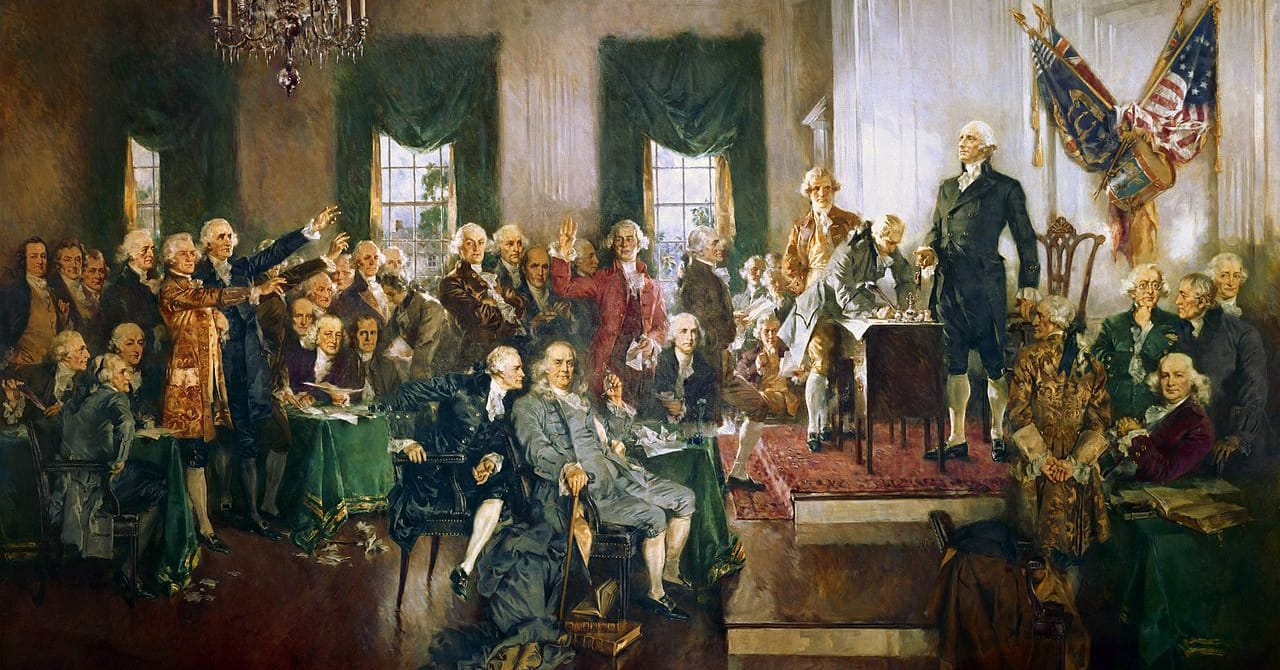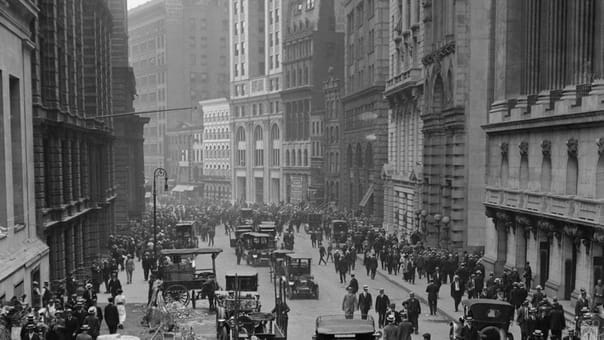America was never just built on ideals—it was built on convenient ideals.

The moment ideals became strategy—America’s Founding Fathers drafting a system where power was never meant to be shared equally.
Liberty? Justice? Democracy? They meant something—until they threatened the money machine. Then, those same principles were repackaged, twisted, and sold back to the masses to keep power where it belonged: at the top.
The Founding Fathers knew it. The revolutionaries knew it. Even today, the playbook hasn’t changed. Talk about freedom. Sell the illusion. Profit off the contradiction.
And no one mastered that contradiction better than Thomas Jefferson.
“All men are created equal.” Powerful words—until you realize they were written by a man who owned over 600 slaves. Jefferson wasn’t just a hypocrite. He was a salesman, spinning an idea so seductive that people still believe it today.
He hated debt but lived in it. He preached small government but expanded federal power. He denounced economic oppression, yet profited from human bondage.
His real genius wasn’t in democracy—it was in selling a dream while protecting his own wealth.
Take his economic policies. Jefferson posed as a champion of the common farmer, yet he worked relentlessly to secure wealth and land for the ruling class. While he attacked industrialization and monopolies in theory, his own plantation empire thrived on forced labor and land expansion.
And when liberty clashed with profit, he chose profit—just like every American leader after him.
This wasn’t a man building a nation of freedom. This was a strategist ensuring that the elite stayed in power while the masses believed they were free.
America’s story isn’t a straight line of noble progress—it’s a constant tug-of-war between principle and profit, ideals and exploitation. And if you don’t see that yet, you’re still trapped in the fairy tale version of history.
The Birth of Selective Freedom
The Founding Fathers talked about liberty but built an empire on control.
They weren’t naïve. They knew that real power isn’t won by speeches—it’s taken by force, controlled by wealth, and justified with ideas that make the masses feel like they’re in on the game.
Look at the Constitution. It’s praised as a blueprint for freedom, but it was really a contract among the elite to protect their economic interests. The South got slavery. The North got commerce. The rich got stability.
The only ones left out? Everyone else.

Jefferson spoke of liberty, but America’s wealth was rooted in forced labor. When freedom clashed with profit, profit always won.
Even the Revolution itself—was it really about justice? Or was it about a bunch of wealthy landowners who didn’t want to keep paying Britain for the privilege of running their own empire?
The same men who raged against taxation without representation were fine taxing their own people into submission.
And when the question of slavery came up? They chose silence. Not because they didn’t know it was wrong, but because owning people was too profitable to give up.
Washington, Madison, Jefferson—these men weren’t liberators. They were architects of a system designed to look like freedom while ensuring that real power stayed exactly where they wanted it.
Because in the end, freedom was never the point. Control was.
The Casino of American Freedom
America wasn’t founded as a republic—it was built as a casino.
The rules were set by the house. The Founding Fathers were the owners. The Constitution? That was the rulebook designed to keep the game running smoothly—giving just enough hope to keep people playing, but never enough to let them win.
The revolutionaries thought they were breaking free, but all they really did was switch casinos.
Instead of paying Britain, they paid American elites who now controlled the wealth, the land, and the labor. The new bosses gave the people just enough tokens of freedom—the right to vote, the right to speak, the illusion of choice—but never enough to cash out.
And just like a casino, those in power knew that as long as people believed they had a chance, they’d never burn the place down.
But not everyone was even allowed to play.
The Indigenous tribes? They weren’t even given a seat at the table—their lands were taken before the casino even opened. The system was never meant to include them, only to erase them.
The enslaved Africans? They were the casino’s living machines, forced to generate wealth while being told they were never part of the game.
The poor white settlers? They were given just enough to feel above someone else—a rigged sense of privilege that kept them from realizing they were just pawns too.
That’s why they left slavery intact—too profitable to remove. That’s why they gave landowners control over voting—too risky to let commoners have a say. That’s why they built the economy on expansion and exploitation—because real wealth isn’t made at the tables; it’s made by owning the house.
They didn’t build a democracy. They built a system where the winners were already chosen.
Language Corner: The Words That Built a Nation
For those seeking language mastery and a deeper understanding of the cultures that shaped early America, here’s something to think about: The U.S. wasn’t just built on English. It was built on borrowed languages—some adopted, some erased.
“E pluribus unum.” (Latin) – “Out of many, one.”
Originally meant to symbolize the unity of the thirteen colonies, but over time, it became a contradictory slogan—used to justify inclusion while the system still thrived on exclusion.
The phrase captures the American paradox: unity in words, division in practice.
“Inali igvyi.” (Cherokee) – “This land is ours.”
Before Manifest Destiny, before the Constitution, before the revolution, this land belonged to civilizations that had their own languages, governments, and histories. Yet, through treaties broken as easily as promises, that claim was ignored.
Expansion wasn’t a noble pursuit—it was a strategic takeover.
Language isn’t just words—it’s history, identity, and power. The words we choose to remember (or forget) tell us as much about a nation as its laws and battles.
The Game Was Always Rigged—Stop Defending the Illusion
You can’t judge history by today’s standards—but you also can’t keep pretending it was something it wasn’t.
Yes, the Founding Fathers played the game the way it was played. That’s how power worked. They didn’t build a nation on freedom; they built it on strategy, control, and economic dominance.
You don’t have to hate them for it. But you do have to stop defending the fairy tale that they were selfless heroes fighting for “the people.”
Because the truth is—you were never meant to win.
The Constitution wasn’t some divine contract of freedom; it was a power arrangement.
The Revolution wasn’t a fight for all people’s rights; it was a business decision. Even today, democracy functions as a rigged market, where the illusion of choice keeps people playing, while the ones who own the house keep cashing in.
And if you know that? Then the real question isn’t whether it’s fair—but what you’re going to do about it.
Because the game hasn’t changed. It’s just evolved.
See the Game, Stop Being Played
History isn’t here to make you feel good. It’s here to show you the patterns of power—so you can stop being a pawn.
America’s founding ideals still shape innovation, drive ambition, and fuel global influence. But let’s be real: those same ideals have always existed alongside ruthless expansion, control, and selective freedom.
That contradiction isn’t a bug—it’s the system. And if you don’t see that, you’re still trapped in the illusion.

From plantations to Wall Street—the game changed, but the house always wins. The illusion of choice is America’s most valuable currency.
Look beyond the surface narratives.
Was America built on freedom, or was freedom just the most effective sales pitch for economic dominance? Was unity ever the goal, or was division the perfect tool to keep power in check? Because every time the country grew stronger, it did so by balancing ideals with raw strategic power.
And here’s the truth—you can hate that, or you can understand it. The game isn’t about moral purity. It never was. It’s about who recognizes reality first and who learns how to move in it.
You don’t have to burn the system down. You don’t have to worship it either. But if you still believe you’re playing on equal ground, you’ve already lost.
So now that you see the game for what it is—what do you do with that knowledge?
